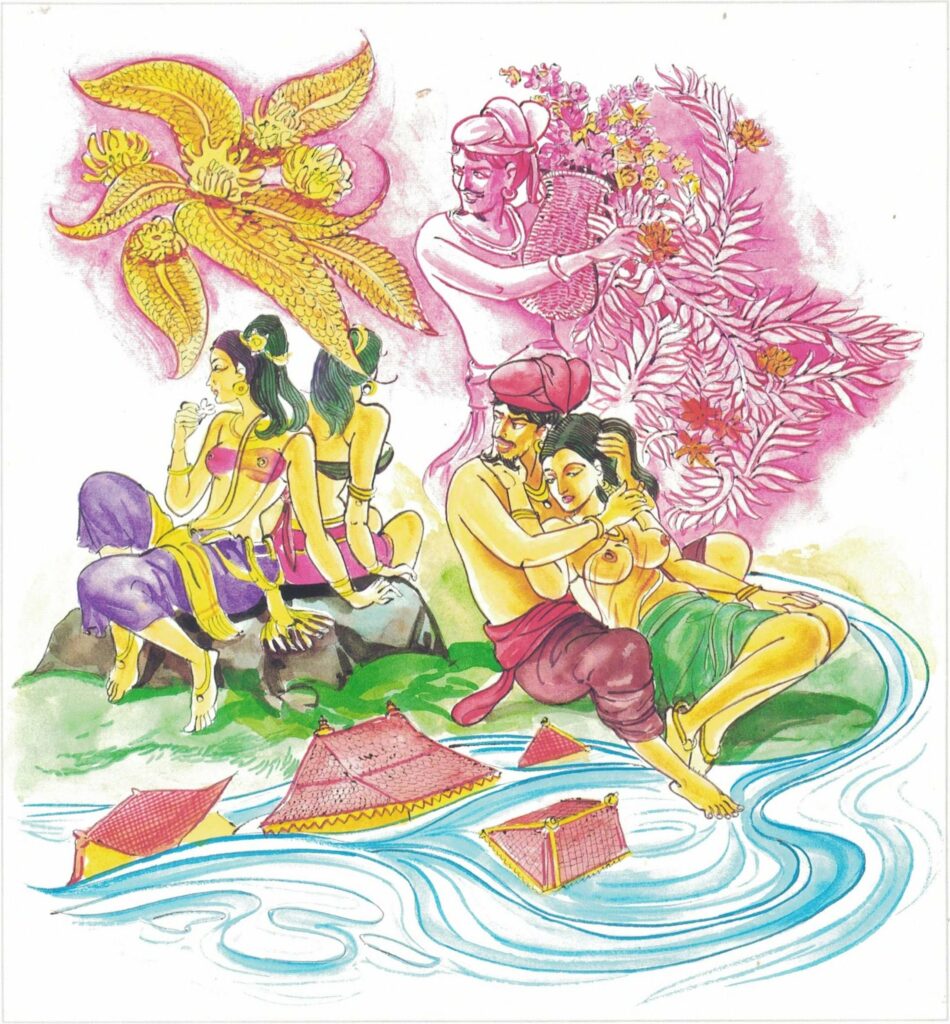Pali text, illustration and English translation of Dhammapada verse 47:
pupphāni heva pacinantaṃ byāsattamanasaṃ naraṃ |
suttaṃ gāmaṃ mahogho’va maccu ādāya gacchati || 47 ||
47. For one who has a clinging mind and gathers only pleasure-flowers, Death does seize and carry away as a great flood a sleeping village.

The Story of Viḍūḍabha
While residing at the Jetavana Monastery, the Buddha spoke this verse, with reference to Viḍūḍabha, son of King Pasenadi of Kosala.
King Pasenadi of Kosala, wishing to marry into the clan of the Sākyans, sent some emissaries to Kapilavatthu with a request for the hand of one of the Sākyan princesses. Not wishing to offend King Pasenadi, the Sākyan princes replied that they would comply with his request, but instead of a Sākyan princess they sent a very beautiful girl, born of King Mahānāma, by a slave woman. King Pasenadi made that girl one of his chief queens and subsequently she gave birth to a son. This son was named Viḍūḍabha. When the prince was sixteen years old, he was sent on a visit to King Mahānāma and the Sākyan princes. There he was received with some hospitality but all the Sākyan princes who were younger than Viḍūḍabha had been sent away to a village, so that they would not have to pay respect to Viḍūḍabha. After staying a few days in Kapilavatthu; Viḍūḍabha and his people left for home. Soon after they left, a slave girl was washing with milk at the place where Viḍūḍabha had sat; she was also cursing him, shouting, “This is the place where that son of a slave woman had sat…”. At that moment, a member of Viḍūḍabha’s entourage returned to fetch something which he had left at the place and heard what the slave girl said. The slave girl also told him that Viḍūḍabha’s mother, Vāsabhakhattiyā, was the daughter of a slave girl belonging to Mahānāma.
When Viḍūḍabha was told about the above incident, he became wild with rage and declared that one day he would wipe out the whole clan of the Sākyans. True to his word, when Viḍūḍabha became king, he marched on the Sākyan clan and massacred them all, with the exception of a few who were with Mahānāma and some others. On their way home, Viḍūḍabha and his army encamped on the sandbank in the Aciravati River. As heavy rain fell in the upper parts of the country on that very night, the river swelled and rushed down with great force carrying away Viḍūḍabha and his whole army.
On hearing about these two tragic incidents, the Buddha explained to the monks that his relatives, the Sākyan princes, had in one of their previous existences, put poison into the river killing fish. It was a result of that particular action, the Sākyan princes had died. Then, referring to the incident about Viḍūḍabha and his army, the Buddha recited the stanza.
Explanatory Translation (Verse 47)
iha pupphāni pacinantaṃ iva byāsatta manasaṃ naraṃ
suttaṃ gāmaṃ mahogho iva maccu ādāya gacchati
iha: here; pupphāni: flowers in a garden; pacinantaṃ iva: like one who plucks; byāsatta manasaṃ [manasa]: with mind glued to the pleasures of the senses; naraṃ [nara]: man; suttaṃ gāmaṃ [gāma]: like a village deep asleep; mahogho iva: by a great flood; maccu: Death; ādāya gacchati: sweeps away
Those men and women, fascinated by worldly things, go about selecting pleasures, like a garland-maker picking the flowers of his choice in a garden. But, gradually and silently, death overcomes them like a flood in the night sweeping away a village asleep.
Commentary and exegetical material (Verse 47)
pupphāni’heva pacinantaṃ: gathering the flowers. The image of the garland-maker is continued here. The ardent garland-maker is absorbed in the selection of the flowers he needs, in a garden. His main and foremost preoccupation is the gathering of flowers. This he does to the exclusion of all other thoughts. In the same way, those who seek sensual pleasures also concentrate on their pleasure, to the exclusion of everything else.
suttaṃ gāmaṃ: a sleeping village. Those who are exclusively preoccupied with sensual pleasures are like those in a sleeping village. They are unaware of the external threats to them.
mahogo iva maccu ādāya gacchati: Death comes and sweeps them away, like a great flood. The sleeping village is unaware that a flood is coming, and all the villagers are subsequently swept away to death by flood waters. Those who are indulging their senses, are also unaware of the external threats to them. Those who indulge in sensual pleasures are swept away by death.